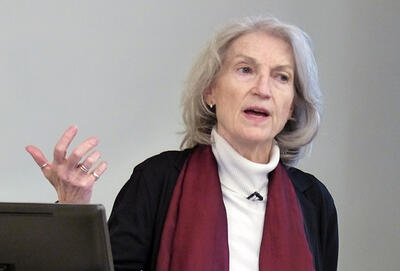American Retail Capitalism and the Origins of the Amazon Economy: Political Scientist Kathleen Thelen on How Mass Retailers Exploited Regulatory Gaps to Succeed

Kathleen Thelen described a “ferociously ambitious retail entrepreneur who was engaged in a really aggressive strategy of relentless expansion, offering convenient at-home shopping” for an “ever-widening range of products, while also maintaining very low prices.”
The company’s success “provoked antipathy among the small, independent merchants who couldn’t match this large inventory and especially low cost,” she said. And critics complained that the retail giant’s profits were being “underwritten by taxpayers because of the central role that the U.S. postal system played in delivering these goods to customers.”
The company’s mostly un-unionized workers were “bearing the brunt of extremely monotonous, but also frantically paced work in state-of-the art warehouses deploying the latest technology.” And, she said, “customers were smitten, because now they had the luxury of shopping from home, choosing from a wide selection of every imaginable product, all at unbeatable prices, with money-back guarantees and special perks for loyal customers, and everything delivered right to their door.”
While Amazon has followed this script closely and added its own 21st Century wrinkles, Thelen was describing Sears, Roebuck & Co., and its groundbreaking home shopping catalog circa 1908.
“There’s something really quite new about Amazon,” said Thelen, Ford Professor of Political Science at the Massachusetts Institute of Technology. “But there is also so much of their strategy that draws on a very old playbook.”
Thelen spoke earlier this month at the Institution for Social and Policy Studies (ISPS), part of the Program on Ethics, Politics, and Economics’ (EP&E) Castle Lecture Series. The series aims to promote awareness of the ethical challenges and complexities of society and foster robust dialogue about the moral foundations of society and government affairs.
“We were thrilled to host Professor Thelen at Yale,” said Ana De La O, EP&E director and ISPS faculty fellow. “Her collaboration with Jacob Hacker and others in advancing exploration of the American political economy provides critical insights into how the country’s political and economic systems interact. Her lecture on the origins of the dominance of massive discount retailers illustrates the long and evolving story of how this dynamic shapes our society.”
Before fielding questions from an appreciative audience, Thelen traced the success and business practices of today’s largest discount retail employers in the United States — Walmart, Amazon, Home Depot, and Target — to developments pioneered by Sears Roebuck and Montgomery Ward more than a century ago. They include low profit margins, high volume sales, political leverage, low wages, venue shopping, circumventing jurisdictions with less favorable regulations for those with more favorable laws, and in some cases legal violations treated as business expenses.
She said that economists and management scholars who have studied retail often produce apolitical explanations for the success of mega retailers, weaving a story “about the size of the American market and technological or organizational innovation on the part of these brilliant entrepreneurs that allowed these companies to grow to dominance.”
But as a political scientist, Thelen has explored how mass retailers took a more active role in shaping the economic landscape for their successes.
“I want to argue that mass retailers in the United States were not simply responding to market opportunities,” she said. “They were creating them, and they were creating them by exploiting regulatory gaps as they grew in scale and scope.”
Thelen discussed how large retailers have long enjoyed an extraordinary, privileged position within the American antitrust regime, took advantage of regulatory fragmentation in which most powers were assigned to states and local governments ill-equipped to govern interstate commerce, and grew to win the political support of an expanding coalition of groups that came to rely on these large companies.
She described how, starting in the 1860s, farmers began to form cooperatives to secure higher prices for their goods and pool orders to secure lower costs for their members. But unlike in Europe, where such cooperatives flourished, American courts often ruled such associations engaged in illegal price fixing.
However, individual companies with their own internal marketing and distribution functions, such as Sears, could safely operate outside the scope of such antitrust laws, she said.
In addition to taking advantage of the U.S. Postal Service to deliver packages, Sears and Montgomery Ward utilized the post office’s money order system, which was created during the Civil war to provide union soldiers with a way to safely send money home.
Even as the United States experienced high and rising inequality in the 1920s, chain stores grew through booms in consumption and consumer spending, aided by expansion of consumer credit in a legal gray zone, Thelen said. From 1920 to 1930, chain stores increased from 30,000 locations to 150,000. After World War II, America’s consumption-driven growth model went into overdrive, aided by government-sponsored housing loans for mostly white, middle-class families. As suburban shopping malls began to dominate, retailers successfully fought against efforts to restrict operating hours on evenings and Sundays.
As such companies grew and proliferated, they built enormous power over suppliers and their workers, cutting labor costs to establish what Thelen called “the American precariat,” a population with low-paying jobs and few if any of the benefits enjoyed by workers in Europe. About 75% of retail workers can be considered low-wage earners, she said. And 15% of them qualify for Medicaid benefits.
“It’s an old recipe that goes back to Frank Woolworth,” Thelen said, noting how in 1892 the department store magnate wrote to his store managers: “We must have cheap help, or we cannot sell cheap goods.”
ISPS Director Alan Gerber thanked Thelen for coming to Yale and sharing her expertise.
“It is part of ISPS’s mission to stimulate these important conversations,” Gerber said. “Understanding the roots of our current economy is a prerequisite for thinking through policies to improve the welfare of American consumers.”
Thelen said the popularity of mega retailers and the structural role they have played in the lives of the populace has generated a deeply perverse equilibrium, in which low profit margins and low wages create an underclass who then rely on low-cost goods to sustain themselves.
But looking back on the long history, she felt optimistic about a solution.
“Policy and politics got us into this cycle,” she said. “Policy and politics can get us out of it.”